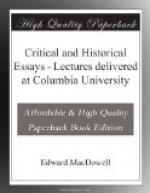More indefinite is the analysis of our second type or element of music. The successful recognition of this depends not only upon the susceptibility of the hearer to delicate shades of sensation, but also upon the receptivity of the hearer and his power to accept freely and unrestrictedly the mood shadowed forth by the composer. Such music cannot be looked upon objectively. To those who would analyze it in such a manner it must remain an unknown language; its potency depends entirely upon a state of willing subjectivity on the part of the hearer.
The third element, as we know, consists of the spoken word or phrase; in other words, declamation. In this, however, the composer cuts loose entirely from what we call language. It is the medium of expression of emotion of every kind. It is not restricted to the voice or to any instrument, or even to our sharps, flats, and naturals. Through stress of emotion the sharps become sharper, with depression the flats become flatter, thus adding poignancy to the declamation. Being unfettered by words, this emotion has free rein. The last element, as I have said, is extremely difficult to define. It is declamation that suggests and paints at the same time. We find hardly a bar of Wagner’s music in which this complex form of music is not present. Thus, the music dramas of Wagner, shorn of the fetters of the actual spoken word, emancipated from the materialism of acting, painting, and furniture, may be considered as the greatest achievement in our art, an art that does not include the spoken word called poetry, or painting, or sculpture, and most decidedly not architecture (form), but the essence of all these. What these aim to do through passive exterior influences, music accomplishes by actual living vibration.
XXI
SUGGESTION IN MUSIC
In speaking of the power of suggestion in music I wish at the outset to make certain reservations. In the first place I speak for myself, and what I have to present is merely an expression of my personal opinion; if in any way these should incite to further investigation or discussion, my object will in part have been attained.
In the second place, in speaking of this art, one is seriously hampered by a certain difficulty in making oneself understood. To hear and to enjoy music seems sufficient to many persons, and an investigation as to the causes of this enjoyment seems to them superfluous. And yet, unless the public comes into closer touch with the tone poet than that objective state Which accepts with the ears what is intended for the spirit, which hears the sounds and is deaf to their import, unless the public can separate the physical pleasure of music from its ideal significance, our art, in my opinion, cannot stand on a sound basis.
The first step toward an appreciation of music should be taken in our preparatory schools. Were young people taught to distinguish between tones as between colours, to recognize rhythmic values, and were they taught so to use their voices as to temper the nasal tones of speech, in after life they would be better able to appreciate and cherish an art of which mere pleasure-giving sounds are but a very small part.




